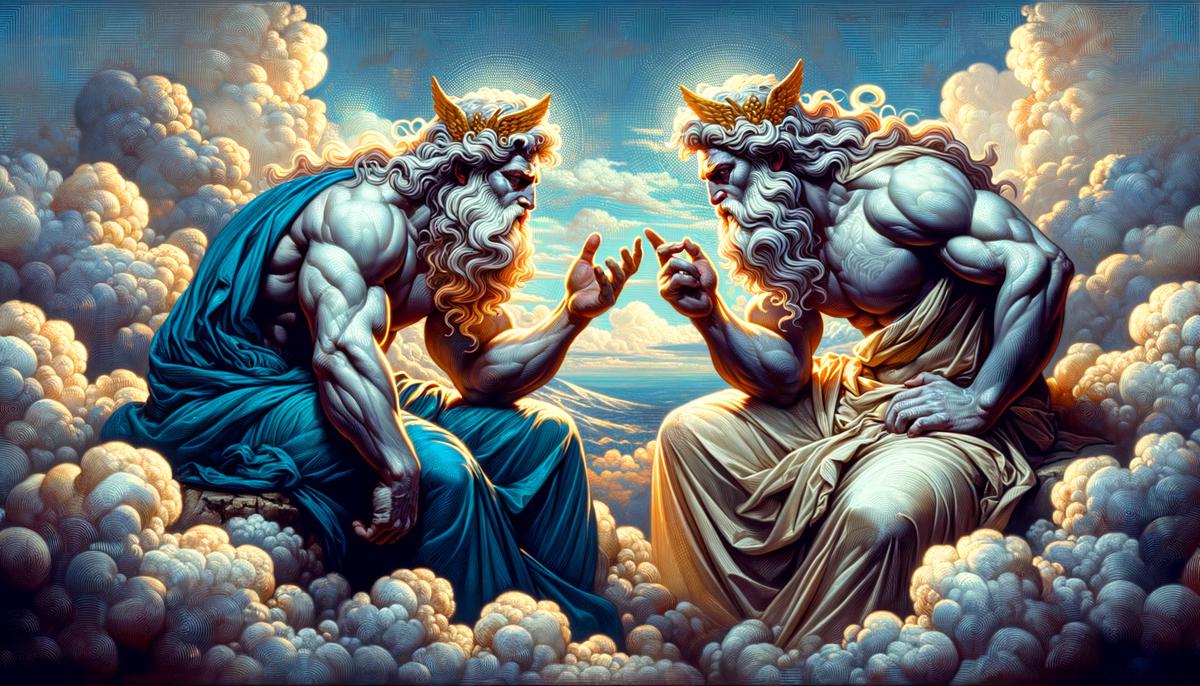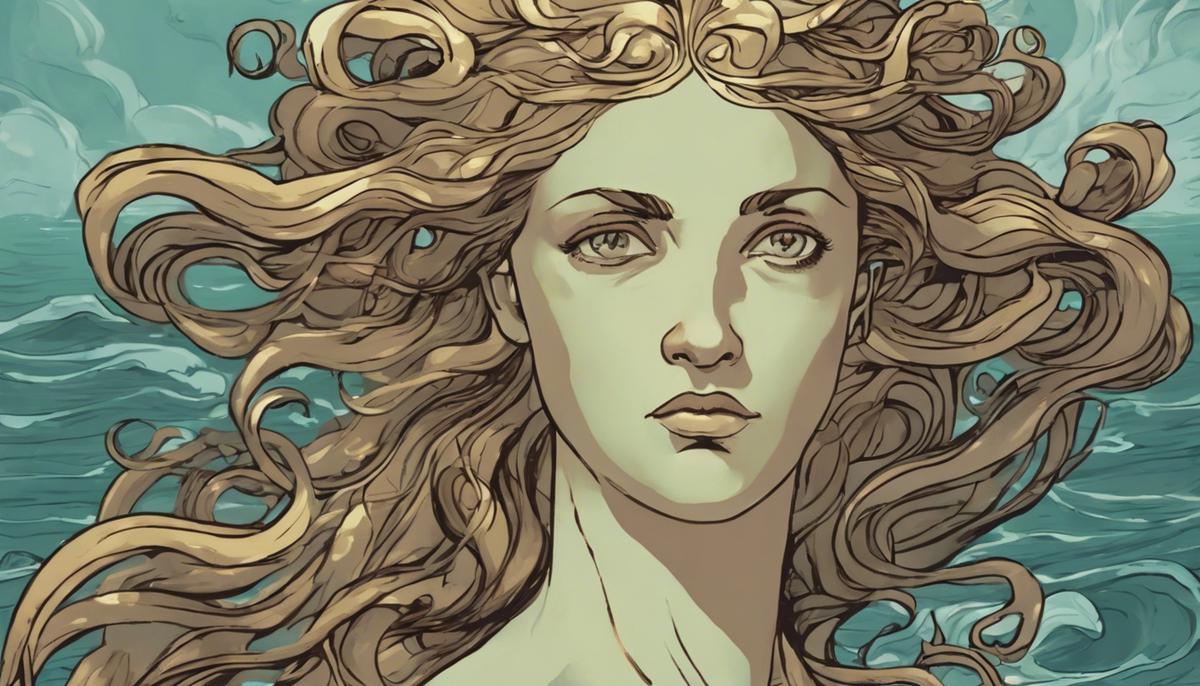Thetis's Divine Lineage
In Greek mythology, Thetis's parentage is crucial for understanding her importance in the celestial hierarchy and influence in earthly tales. Born from Nereus and Doris, Thetis carries a rich divine heritage that underscores her role among the deities. Nereus, her father, known as the "Old Man of the Sea," was reputed for his truthfulness and wisdom, characteristics that ripple through his daughter's life. Doris, her mother, adds another layer of depth as a sea goddess associated with the bounty and nurturing essence of the ocean, illuminating Thetis's ties to sea life and maritime realms.
Taking her place as a Nereid, among fifty sisters, Thetis emerges not merely as one wave among many, but rather as a leading ripple, crowned informally as their guide and often their voice. This status spotlights her leadership quality, colored with the vibrancy of her mother's nurturing essence and her father's deep wisdom.
This marriage of parental traits manifested in Thetis's abilities and stories—spanning talents like shape-shifting to emotionally charged sagas involving her son Achilles. Her lineage set the stage for both the blessings she would deliver and the challenges she'd face; every flick of her mythological tale bore the whispers of the sea's ancient depth handed down by Doris, and the sagacious maritime winds steered by Nereus. The harmony, or at times clash, within her parentage paints a multi-faceted figure at the heart of many pivotal Greek myths, steering human fates with wavering ocean tides.
The impact of the heritage shining through Thetis reflects in her presence among sea gods and in her engagements across mighty gods and mortals in myths and epics; her divine birthright threads through every layer of her far-reaching narratives.
Thetis and the Prophecy
One of the central prophecies that reverberated through Olympus was that Thetis was destined to bear a son who would be greater than his father. This prophecy worried both Zeus and Poseidon, two of the mightiest gods, who had initially been captivated by Thetis's allure. Imagine the scene: the king of the gods and the ruler of the seas, both ready to court a dazzling sea nymph, only to step back at the prophecy's revelations!
This fear of a son who might surpass them (Zeus had overthrown his own father) led both gods to shift from suitors to matchmakers. They plotted to bind Thetis not to a divine regent but to a mortal—Peleus, celebrated for his heroism yet safely mortal. The implications were clear: a limit would be set on the potential upheaval that a divine son might cause.
This wasn't just any arranged marriage; it became a masterclass in celestial manipulation. Thetis wasn't handed over willingly; snatching her consent required true Olympian guile. Peleus had to sneak up on her while she napped by the shore and, following the advice of the sea-god Proteus, hang on tight as she shifted through various forms. This dramatic catch played out like an ancient shapeshifting contest—flame turned water, lioness turned serpent—all spun from Thetis's yearning for freedom. Yet, Peleus's relentless grip saw this tidal wave of escapes ebbing away as Thetis finally consented.
Their wedding was heralded as a major event. Gods and goddesses attended, and capricious whims like that of Eris, goddess of discord, sowed seeds that ultimately led to the Trojan War. What should have been marital bliss shook the foundations of mythological worlds.
This union—goddess to mortal—explores interesting themes. Thetis and Peleus's tale isn't just about marrying off a sea goddess to fend off prophetic doom; it's about power dynamics, celestial fears, and the drama of what it means when gods meddle in mortal affairs. We witness a seismic shift beneath mythological feet where destinies intertwine and fates collide.
The union between Thetis and Peleus mirrored mortal and divine realms colliding and reflections on fears, destiny, and the quirks of divine diplomacy. Each step taken, from seashore encounter to nuptial ceremony, whispered across the oceanic watch and celestial skylines—an echo remembered whenever myths are told.

Thetis in the Trojan War
In the echoes of the Trojan War, Thetis was never just watching from the sidelines. Imagine her—entrenched in the labyrinths of fate, not merely as a deity but as a mother. When her beloved Achilles, dragged along by the threads of prophecy and honor, landed on the sands of Troy, Thetis's heart was torn with a mother's concern whisked together with celestial foresight.
As conflicts unfolded by the swiftness and brute of Achilles—whose warrior rage became a pivotal centerpiece in Homer's tale—Thetis found herself in a spiral of divine negotiations, begging the destinies to slacken for her son. Far from the tender sea froth she commanded, she stood against the stormy whims of godly brethren entrenched in almighty politics.
The tides took a grievous turn when Patroclus, garbed in Achilles's armor—a heroic mix-up—fell by the spear of Hector. Here arose a monumental pledge by Thetis, unveiling a frontier of a mother's endurance cocooned in divinity. With the vestments of Achilles laid waste, Thetis's resolve rippled across seas and ascended Mount Olympus seeking Hephaestus's forge.
She faced unholy hours, imploring Hephaestus to craft an armor fit for a mortal bred of divinities. It's here between the clank and blaze of the godly anvil that maternal love met immortal might. Hephaestus complied, acknowledging Thetis's oath-sealed bond from eons ago.
But her cause was not beholden solely to weapons of warfare. Amidst thunderous clashes, Thetis, wading through tears and tendrils of consequence, foresaw the seeds of melancholic destiny sown for Achilles. Her diving emotions curled around the grief that no shield nor spear could parry. Can't you just visualize her—a figure pitched against legacies carved by prophecies?
Amidst reflective motherly night watches, which may have tasted the tang of seawater and wishful solace, she rendered what every parent offering refuge from inevitable sorrows might—a drizzling of nectar divine; ambrosia fueling Achilles's vigor against collapse under war's demands. Reflect here for a moment—the discouraging permanence promised by myth-bound heights to this mother grappling with the ethos of a heavenly finale.
Returning Hector's body—a stern bidding by celestial councils—was a task donned by Thetis. Approaching her wrought son amidst cruel felicities of war-rage, she uttered counsel steeped in deities' dread and revere.
Thetis's journey throughout the Trojan War is less about interventionist cameos marking myths' muscular chapters—they're tears spilled along ache-thirsty soil scribbling stories grand yet intimate. Threading through murk of fate—sometimes beside her son's hefty strides or moonlit vestiges—the silver-footed Nereid showed that even gods could guise as much in pervasive vulnerabilities guided by shedding hearts as in power-strapped acts paving odes kept aflame along humanity's undying oral tapestries. Behold then: Thetis, not just conjured from salty depths, but mother first—an immortal echo to mortals' songs mirrored across time's relentless churn.

Thetis's Powers and Symbolism
Being a sea-nymph blessed with the powers of prophecy and shape-shifting, Thetis shimmered bright, lacing myths with awe. These supernatural abilities extended beyond mere spectacle; they twined into the essence of her impact on Greek tales and left ripples across cultural perception.
First, let's dive beneath the surface of her shape-shifting prowess. In myths, this power signifies fluidity and adaptability—traits as intrinsic to water as to Thetis herself. Her metamorphic gifts shed light on the nature of existence, embracing change as a constant of life. Remember how Peleus had to grapple with her multiple transformations before she consented to marry him? That wasn't just a party trick. Instead, it unveils a profound narrative layer—the capability to adopt such multifaceted facades allowed Thetis to elude unwanted fates and attests to her mastery over personal autonomy. As if nature itself played poetic custodian, these shifts reflected the continuous flux and flow embraced by the oceans' undulations.
Then there's prophecy—a power giving voice to the silent songs of destiny. Inherent in this ability is not only the knack for foresight but also the entwining of Thetis in the fabric of mythical time itself. As the inevitability of fate whispered through ancient Greece, prophecy underscored an acceptance of preordained paths—paths that even gods found inexorable. Thetis's prophecies carried a double edged depth, serving both as blessings and burdens. For what is a foretold truth but a roadmap etched onto the souls it concerns?
The synergy between Thetis's prophecy and her shape-shifting feats spins an intricate tapestry that embroidered her role in myths. Consider the nuanced dual-state of fluidity and foreknowledge; while one allowed unpredictable freedoms, the other constrained her within the threads of fate's stern loom. It's a haunting ballet between control and surrender, encapsulated in our water-laden heroine.
In broader cultural symbolism, Thetis's powers allude to the mystical allure and peril of nature. Greeks didn't just idolize their environment—they infused it with a sacred essence, witnessed in every deity empowered by natural dominions. Thetis, embodying both the serene and stormy realms of the sea through her means of transformation, stood as an emblem of harmonized duality: creation coupled with destruction, birth shadowed by inevitable decadence.
Delving into this wellspring shows us that Thetis was not merely a fixture in Greek mythology but a poignant symbol crystallized by the virtues and fears of the culture that venerated her. Thus, by making incarnate the bequeathed murmurings of destiny's depth in tandem with the endless ebb of existential variability—she mirrors an etched quintessence pivotal to understanding both the superstrate and substrata of Greek myth and culture. Her narrative is a lustrous haunt, one where every shift and whisper accommodates a universe teeming with gods, humans, and those elusive shades between that sway in the urge of olden sea-songs like whispers and crescendos of winds through her shoreline-reaped destiny.

- Homer. The Iliad. Trans. Robert Fagles. New York: Penguin Books; 1990.
- Hesiod. Theogony. Trans. Glenn W. Most. Cambridge, MA: Harvard University Press; 2006.
- Ovid. Metamorphoses. Trans. David Raeburn. New York: Penguin Books; 2004.
- Apollodorus. The Library of Greek Mythology. Trans. Robin Hard. Oxford: Oxford University Press; 1997.

Leave a Reply